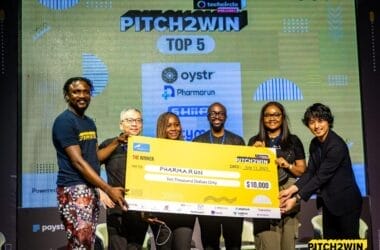The Global Alliance for Clean Cookstoves, also known as “the Alliance” alongside its capacity building and grant management support partner, Wennovation Hub Initiative organized a 2 day Boost workshop for clean cookstoves enterprises at the Lagos branch of the Hub on 25th & 26th January, 2017.
The Alliance is a public-private partnership hosted by the United Nations Foundation to save lives, improve livelihoods, empower women, and protect the environment by creating a thriving global market for clean and efficient household cooking solutions. Part of the Alliance’s strategy to create a thriving global market is to strengthen the supply of clean cooking solutions by attracting more finance and investment into the sector. In order to increase investment to grow the sector, the Alliance is working to prepare the market for scale, support the development of commercially viable and scalable enterprises, and raise awareness in the investor community of opportunities within the sector. To achieve these, the Alliance rolled out its Catalytic Small Grant program (CSG) in Nigeria in January 2017.

The CSG program took off with 2 representatives of each of the 17 selected enterprises across 11 Nigerian states converging at Wennovation Hub in Lagos for the Boost workshop. The Boost workshop was based on a curriculum developed by the Global Social Benefit Institute (GSBI) at Santa Clara University with support from the Alliance, localized to the Nigerian context by Wennovation Hub and facilitated by the Executive Director of the Hub at the recently concluded workshop.
The Boost workshop was targeted at clean cookstoves enterprises who wish to document and articulate key aspects of their enterprises’ business plans. Participants at the workshop worked through a series of “learn by doing” modules that enable entrepreneurs to learn concepts while they develop business plan elements specific to the clean cookstoves sector and modules on social impact model, target market and value proposition, marketing, sales and partnerships, financial model, and growth strategy.
Nigeria being one of the Alliance’s focus countries – also including Ghana, Uganda, Kenya, Bangladesh, Guatemala, China and India – had significant geopolitical representation at the workshop. 34 participants attended the workshop from Lagos, Oyo, Ogun, Ondo, Niger, Abuja, Kaduna, Zamfara, Delta, Bayelsa and Rivers states. This testifies to the growing adoption of clean energy in Nigeria.
The Facilitator, Oluwole Odetayo emphasized the need for a clean energy atmosphere and mentioned climate change, diseases such as cancer, high cost incurrence by low income earning families amongst others, as the major challenges faced and hence, the need to seek alternatives.
While presenting his keynote speech, Amit Anthony Alex – the Enterprise Development Manager for Global Alliance – stressed the need to fabricate locally made cooking stoves which will be cheap and affordable and at the same time be efficient. He also talked about the need to reduce the level of Poverty in Nigeria and Africa at large. He buttressed that people in the rural area could be trained on making these stoves for commercial purposes which will ultimately result in the reduction of poverty and unemployment.

Also present at the workshop are program partners including Shell Nigeria representatives, Joy Ikhine & Ibukun Adewale; International Center for Energy, Environment & Development (iceed) – the Nigerian Alliance for Clean Cookstoves host – Precious Onuvae; I-DEV International Kenya representatives, Darshan Shah & Gerald Njugi.
To wrap up the workshop, each enterprise had 10 minutes to make a presentation of their executive summary. The executive summary was expected to contain
- Mission statement
- Problem statement
- Solution description
- Value proposition
- Target market segmentation
- Marketing, sales and distribution strategy
- Key partners
- Value chain diagram
- Financial model and
- Growth summary
After the presentations, Amit gave the closing remarks and thanked Wennovation Hub for hosting and organizing a great workshop. He thanked all participants, acknowledge their good works and mentioned that the workshop winners would be communicated in due time. Mrs Precious, a representative of Shell Petroleum also expressed her appreciation to Wennovation Hub, acknowledged the participants and encouraged them not to stop innovating and working hard to make our country and the world a safer and better place to live in.
The workshop which came to a close at about 6pm on Thursday, 26th of January 2017, reiterated Wennovation Hub’s proud support for sustainable ecosystem initiatives.
The CSG program next steps include investment readiness analysis of 6 enterprises selected from the workshop; award of small grants to 3 selected enterprises post investment readiness analysis; capacity building and grant management support for the selected grantees.
As an Amazon Associate, TechCity may earn a small commission if you shop these products.
















